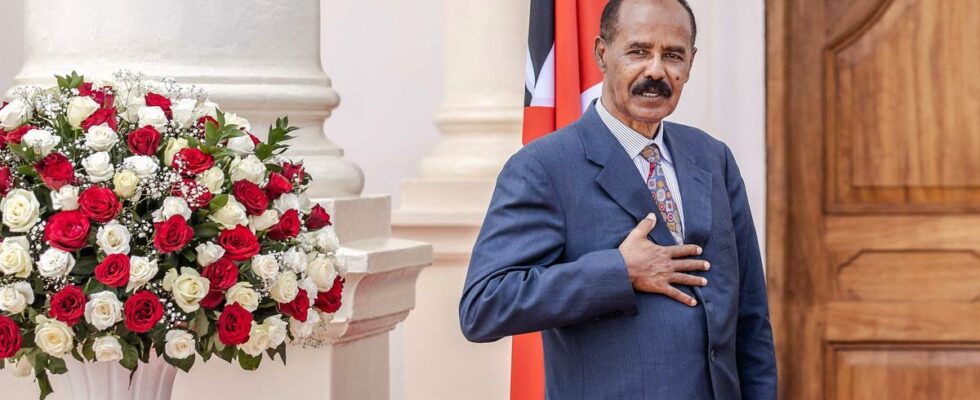Eritrea’s President Isaias Afwerki at the State House in Nairobi, Kenya, February 9, 2023. LUIS TATO / AFP
Eritrean President Issaias Afeworki on Thursday (February 9th) rejected accusations of human rights violations by his army in Ethiopia’s Tigray region, calling them “chimera” and of “disinformation“.
“There is a pipe dream in the minds of those involved in (…) what I call a disinformation manufacturing enterprisehe told reporters at a press conference in Nairobi with his Kenyan counterpart William Ruto, without answering further questions about the Eritrean military presence in neighboring Tigray.
TO HAVE ALSO – What are the conclusions of the annual report of the NGO Human Rights Watch?
Accused of committing atrocities
Eritrean troops supported Ethiopian government forces in their offensive launched in November 2020 against those of the rebel authorities in the Tigray region from the Tigray People’s Liberation Front (TPLF), a sworn enemy of the Asmara regime. The United States and human rights organizations have accused them of committing atrocities during the conflict, including the massacre of hundreds of civilians.
A peace accord was signed in November 2022 between the Ethiopian government and the Tigray rebels, but Eritrea did not participate in the talks and its troops continue to be present in the region, according to residents. The peace agreement provided in particular for the disarmament of the Tigrayan forces, which was to be done “simultaneously with the withdrawal of foreign forces», in reference to Eritrea, never mentioned in the document. The Tigrayan rebels began in January to surrender their heavy weapons.
Read alsoEthiopia: the government announces the sending of funds to Tigray
Access to Tigray being restricted, it is impossible to independently verify the situation on the ground, in particular the presence of Eritrean forces. “I have no intention of interfering in this matter despite the disinformation campaign undertaken to try to disrupt the peace process in Ethiopia and create a conflict between Eritrea and Ethiopiasaid Mr. Issaias, 77, still avoiding the question of the presence of his troops in Ethiopian territory.
“Do not take Eritrea as an excuse for the problems of Ethiopia or the rest of the region. Don’t try to drag us into this. It is a chimera of those who want to derail any peace process“, he insisted. The peace agreementis signed, it will take time to be set up in the fieldcontinued the Eritrean head of state.
Read alsoIn Ethiopia, France and Germany at the bedside of peace
Addis Ababa and Asmara have for months denied any Eritrean involvement in Tigray. At the end of March 2021, Ethiopian Prime Minister Abiy Ahmed finally admitted their presence. Their departure was announced several times, but never verified. These troops have been accused of looting, massacres and rapes throughout the conflict, particularly in the city of Aksoum or the village of Dengolat.
The precise toll of this conflict punctuated by abuses, which took place largely behind closed doors, is unknown. The African Union envoy for the Horn of Africa, Olusegun Obasanjo, said in mid-January that up to 600,000 people were believed to have been killed. The war has also displaced more than two million people and plunged hundreds of thousands into near-starvation conditions, according to the UN.
TO HAVE ALSO – Ethiopia: Ethiopian rebels and authorities agree on humanitarian access to Tigray
Power restored in parts of Tigray
During the press conference, the two leaders also announced the return of Eritrea to the Intergovernmental Authority on Development (Igad), a group of East African countries that Asmara had left in 2007 following disputes with Ethiopia. Igad is notably responsible for supervising the peace agreement.
Since the signing of the agreement, power has been restored to parts of Tigray, as well as air links. In September, experts reported to the UN Human Rights Council that war crimes and crimes against humanity were likely committed by all warring parties during of the war in Tigray.
On Thursday, the NGO Human Rights Watch called for sanctions against Eritrean leaders, accusing the authorities of forcibly enlisting thousands of people, including minors, for military service and punishing the families of those who evade them. .
TO HAVE ALSO – Ethiopia: nearly 40% of the population of Tigray “in extreme shortage of food”
